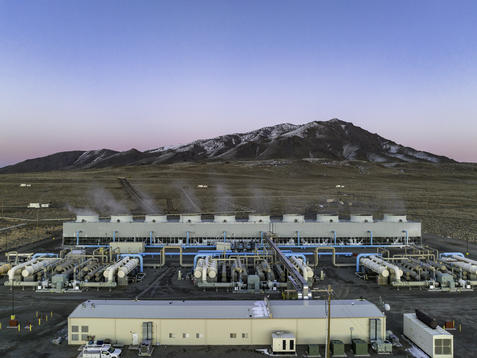Google was the first major global company to publicly commit to 24/7 carbon-free electricity (CFE). Back in 2016, the tech giant published a paper stating that the ultimate way to tackle the emissions arising from its electricity consumption was to power its operations by carbon-free, local energy on an hour-by-hour basis. Four years later, Google announced its ambitious goal of running all its data centres and office campuses worldwide on 24/7 CFE by 2030.
Google is now utilising their extensive experience and expertise by joining Climate Group’s 24/7 Carbon-Free Coalition as one of its Founding Partners.
A renewable energy pioneer
When it comes to the energy transition, Google has been a corporate pioneer for over a decade. The company signed its first renewable energy power purchase agreement (PPA) in 2010. Seven years later, it reached its goal of matching 100% of its global, annual electricity consumption with renewable energy purchases.
This milestone was just the start of a major push by Google’s sustainability leaders towards full decarbonisation. The focus was not just on the company’s own operations, but also the wider need to decarbonise energy grids.
“Climate change is a shared challenge we must address together. It’s all about collaboration. At Google, we have learned a lot of lessons about the journey toward around-the-clock carbon-free electricity. We want to share those insights with companies embarking on a similar journey, while also learning from other clean energy leaders. That’s why, we’re really excited about being a Founding Partner of the pilot launch of the Climate Group’s campaign and engaging with other businesses on this collective ambition.”
“Climate change is a shared challenge we must address together. It’s all about collaboration. At Google, we have learned a lot of lessons about the journey toward around-the-clock carbon-free electricity. We want to share those insights with companies embarking on a similar journey, while also learning from other clean energy leaders. That’s why, we’re really excited about being a Founding Partner of the pilot launch of the Climate Group’s campaign and engaging with other businesses on this collective ambition.”
A collaborative process
It is well understood that no company, no matter how big it is, can drive wider grid decarbonisation by itself. That’s why Google shares its sustainability learnings and innovations with others to advance wider change that will benefit everyone. One example is pioneering the use of Time-based Energy Attribute Certificates (T-EACs) which improve upon today’s clean energy credits by enabling clean energy generation and trading to be tracked on an hourly basis. T-EACs are important to both verify hourly matching, but also provide new incentives for carbon-free energy to be produced where and when it’s needed most. Google is now working with other companies to build new marketplaces for these instruments that can accelerate decarbonisation impact.
Transparency is central to this ethos. That’s a value that has driven Google’s sustainability team when it comes to its decarbonisation journey. Being open means being able to share not just what works, but what barriers to progress exist so that we can all learn together.
Next generation carbon-free energy
Google’s 24/7 CFE goal encourages the Google team to think about new solutions needed to fully decarbonise electricity consumption. While Google continues to focus on significant deployment of variable renewables, like wind and solar, it’s also advancing energy storage, demand flexibility, and dispatchable carbon-free energy technologies that can provide electricity on demand.
For this reason, Google has become a significant backer of advanced carbon-free energy technologies. As a case in point, in 2021, it signed the first corporate agreement to develop a next generation geothermal power project with startup Fervo Energy. Unlike traditional geothermal energy power – which is found in places like Iceland where there are volcanoes, geysers and hot springs – this new approach uses drilling innovations from the oil and gas industry to access underground heat from places that were previously unreachable. In 2023, the plant became operational and is now delivering carbon-free electricity to the grid that serves Google’s data centres in Nevada.
In 2024, Google also announced a new initiative with Microsoft and Nucor to aggregate the companies’ electricity demand to accelerate the deployment of advanced carbon-free electricity technologies, including next-gen geothermal, advanced nuclear, long-duration storage, clean hydrogen, and others.
Joining Climate Group’s 24/7 Carbon-Free Coalition as a Founding Partner aligns with the ongoing work that Google has been spearheading in the space.
For further information about Climate Group’s 24/7 CFE campaign, please sign up to our newsletter.


